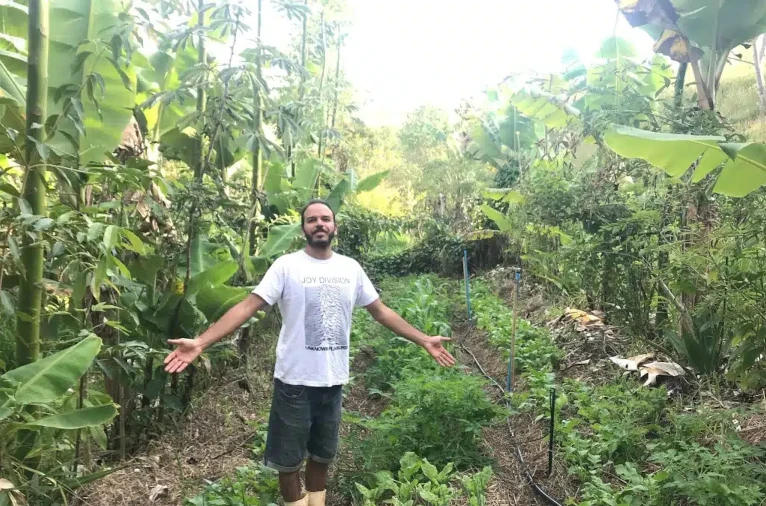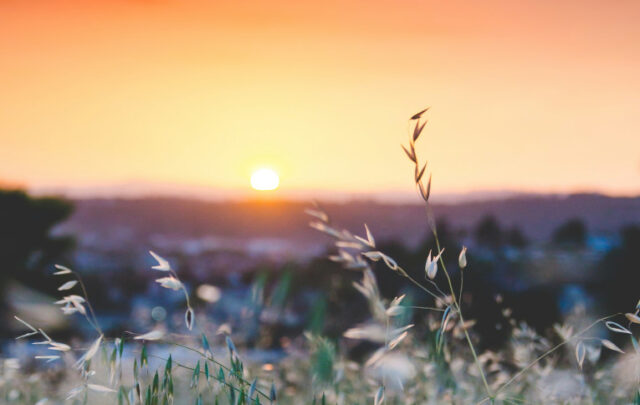Indigenous Knowledge by a new name
Desperto – Centro de Culturas Regenerativas is a regenerative agriculture initiative situated in Vale do Paraiba, Sao Paulo, Brazil. Co-founders Michel Bottan and Gabi Besser bought the land in 2007, intentionally choosing a degenerated piece of land whose water source had dried up, in order to show how syntropic agricultural practices, as developed by Ernest Goethe, could have the greatest impact possible on ecological restoration. They saw syntropic farming as a simple way for anyone to become involved in ecosystem restoration by planting food forests and they describe it as ‘a new name for processes used by indigenous peoples for millenia’. They recognise it as a very resilient system based on learning how to mimic nature.

Co-founders Michel and Gabi
Michel came from background in technology and entrepreneurship and Gabi was a social entrepreneur. They were greatly influenced by Fritjof Capra’s Systems Thinking and an interest in indigenous culture and cosmovision. So they gave up everything in the city and with no experience, bought these close to 6 hectares of degraded land, without perennial water, near the metropolis of Sao Paulo, in order to bring the knowledge of healing people and planet to the urban communities, through restoring the land along the principles of syntropic farming and cultural regeneration; restoring the ecosystem, creating food forests and developing an awareness of the vital importance of this in young people.
Watershed management
Michel admits that choosing degraded land was a much bigger challenge than they had thought. Some of the major challenges they faced were fires, always triggered by neighbours using slash and burn to clean up their land. In their very first month they had a major setback when a fire burned 90% of the vegetation and land and they partially lost their electric system, pipes and fences. They faced the same risk in the next years, but they prepared a pump and pipes in strategic points to fight the fires and this has saved them twice since then.
The water challenge has been huge. Their water came from a neighbouring farm so, as well as not being a secure source, as that farm went up for sale, it also required pipes and pumps that were expensive and time consuming to fix. Broken buried pipes took days to locate and fix and, even then, the water quality was poor.

Gaby working the land (with a bit of help from a furry, rootling friend)
This situation has been resolved thanks to a donation in 2023 from Nathalie Kelley (Peruvian actress and indigenous climate activist) who found Desperto through Ecosystem Restoration Communities. Nathalie visited them and stayed for a week, collaborating in the daily activities and thinking through projects of food sovereignty as used by indigenous people. At the same time, she perceived that they were struggling with their water situation and supported them to build the well. This has been life changing, according to Michel and Gabi.
The site was grazing land before they bought it and the soil was very compacted and impermeable. The first agroforestry was planted in the watershed to increase water retention. After any strong rainfall the water washed the soil away and was lost, but after five years the surface water no longer flowed away. The canopy and root systems of the growing forest were able to retain water.
Surviving the pandemic
In the first couple of years, as well as planting and building, they tried to sell vegetables they had grown at the local market but found that people did not value organic locally produced food enough to make this work. There just wasn’t a sufficient market for the produce. They had just developed enough infrastructure to open their gates to guests through retreats and had people booked onto retreats and courses when Covid struck. With no other option they put the guest houses on Airbnb and for two years kept working on improving the farm.

Michel on the lush, plentiful syntropic farming site
Amplifying abundant agroforestry
During this time they introduced more native plants such as mandioca (cassava) and green bananas as crops and into their diets. These have gradually transformed their diet to use less grains. They have also managed to source once common fruits that are now rare and even close to extinction, such as Juçara. They still have the citrus fruits and peaches they started with as well as broccoli etc., in the clearings in the forest, but they have become more interested in discovering original native foods such as the Pinhao (a large pine nut) from the Araucária tree. They are learning about the plants still being lost that were known to the indigenous Kayagangi tribe in order to ensure their de-extinction but also experimenting with plants from other food forests from other biomes, such as cacao, avocado and macadamia, to see if they will succeed in their ecosystem at the top of a mountain, caught between Atlantic Rainforest and arid plain.

Healthy soil is everything!
Community building through nature
Following the pandemic, they finally started running the courses and retreats they had been planning; the aim was to bring people in for nature reconnection, meditation, detox and relaxation but then to offer them so much more in terms of introducing them to food forests and regenerative culture. But it was still just the two of them managing all this workload. Then a boost they received in 2022 was three people finding them through the internet, who ended up being a perfect fit for joining them and so the community started to grow. They were joined by Kelly Oliveira, Renata Siegman and Thiago Cabral who shared their vision and had experience in permaculture, nutrition, education and illustration, so all of their skills are contributing to the initiative and complementing skills Michel and Gabi already had.

Planting Turmeric at the agroforestry site
Introducing a regenerative culture
Each challenge and success of the project made them realise more and more that the transition needed was beyond just ecological restoration and called for lifestyle change to a regenerative culture, considering their relationship with themselves, others and nature.
To commemorate World Environmental Day in 2023, and with $3k funding from the ‘One Tree Planted’ initiative, Desperto hosted their first Regenerative Culture Festival for the community. People came to relax in nature and enjoy music but they also experienced the positivity of a local, sustainable, economic model. Trees were planted, food was eaten, workshops were enjoyed and connections were made. City dwellers met indigenous musicians, saw a different way of living and put their compostable plates straight into the wormery! The popular YouTuber Chico Abelha supported the festival and they feel that his involvement broadened the range of people who came to the event beyond the usual suspects, which really helped them begin to realise their vision of evolving the consciousness of their neighbours. They were able to demonstrate their food forests to local landowners, many of whom are still against planting trees because trees limit the potential grazing land and hence, they feel, land value. They also welcomed and connected with Sao Paulo residents, who do not all realise their intimate connection with the natural world and how possible and advantageous it is to their lives, to live simply and in harmony with nature.

Michel leading the band at the Regenerative Culture Festival
Michel and Gabi’s hopes for regenerative culture were alive and kicking, and saw this event as a breakthrough, and massive step forwards in community outreach. It revealed the potential of their initiative to be regenerative by changing the culture and attitudes of people cut off from nature by allowing them to experience the land becoming abundant and to realise how this is replicable. Since the event they have had lots of enquiries from more potential community members. They have also had many more retreats.
A CURE for people + planet
Gabi and Michel have a long-term goal of establishing a network of regenerative cultural communities, for which they have developed the acronym CURE (CUltura Regenerativa). They are creating an Associacao Desperto and want the community to eventually buy the property. With the profit they will then buy another piece of land where they can replicate this regenerative syntropic community model. Gabi and Michel feel that Desperto is a transition space, which they will move on from, in order to pioneer another. They are delighted that their social organism, Associacao Desperto, is growing naturally. They welcome volunteers who would like to spend time with them.

Unforgettable sunrises at Desperto
To learn more about Desperto and get involved visit their page on the ERC website or go to https://www.desperto.com.br/





